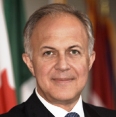ANDERSON, Carl
 Carl A. AndersonCarl A. Anderson is the chief executive officer and chairman of the board of the world's largest organization of Catholic laymen with more than 1.7 million members. He has worked more closely with the Vatican and with Popes John Paul II and Benedict XVI than nearly any other layman in the United States. He is frequently interviewed on Vatican Radio and has written for L'Osservatore Romano. He has been a frequent guest on Catholic television and radio as well as on CNN, Fox News, MSNBC, NBC's Today Show and NPR's All Things Considered. Anderson's Vatican-related expertise includes his appointment by Pope Benedict XVI as a member of the Pontifical Council for the Family (2007) and as consultor to the Pontifical Council for Social Communications (2006). Because of previous appointments by Pope John Paul II he serves as a consultor to the Pontifical Council for Justice and Peace (2003) and as a member of the Pontifical Council for the Laity (2002) and the Pontifical Academy for Life (1998).
Carl A. AndersonCarl A. Anderson is the chief executive officer and chairman of the board of the world's largest organization of Catholic laymen with more than 1.7 million members. He has worked more closely with the Vatican and with Popes John Paul II and Benedict XVI than nearly any other layman in the United States. He is frequently interviewed on Vatican Radio and has written for L'Osservatore Romano. He has been a frequent guest on Catholic television and radio as well as on CNN, Fox News, MSNBC, NBC's Today Show and NPR's All Things Considered. Anderson's Vatican-related expertise includes his appointment by Pope Benedict XVI as a member of the Pontifical Council for the Family (2007) and as consultor to the Pontifical Council for Social Communications (2006). Because of previous appointments by Pope John Paul II he serves as a consultor to the Pontifical Council for Justice and Peace (2003) and as a member of the Pontifical Council for the Laity (2002) and the Pontifical Academy for Life (1998).
He is the editor with Msgr. Livio Melina – and contributor to – The Way of Love, Reflections on Pope Benedict XVI's Encyclical Deus Caritas Est published by Ignatius Press in 2007; simultaneously published in Italian and Spanish. He was the only Catholic layman from North America to serve as an auditor to two recent World Synods of Bishops held at the Vatican appointed by Pope Benedict XVI (2005) and by Pope John Paul II (2001). He served as a member of the Vatican delegation at the Meeting of the International Jewish Liaison Committee held in Jerusalem (1994). In 1998, Pope John Paul II appointed him to the Pontifical Academy for Life.
Anderson was appointed by the president to the three–member U.S. Delegation for the Inaugural Mass of Pope Benedict XVI on April 24, 2005.
Anderson has taught as a visiting professor at the Pontifical John Paul II Institute for Studies on Marriage and Family at the Pontifical Lateran University in Rome from 1983 to 1998, and in 1988 became the founding vice president and first dean of the Washington, D.C., session of this graduate school of theology located at The Catholic University of America. He serves as a member of the International Scientific Council of the Studium Generale Marcianum of the Archdiocese of Venice as well as on the editorial/scientific committees of the scholarly journals Anthropotes (Rome), Oasis (Venice), Humanitas (Chile). He has lectured on Catholic issues in Belgium, Canada, Chile, Cuba, France, Germany, Israel, Ireland, Italy, Mexico, Spain, the Philippines and Poland.
Anderson was appointed a consultant to the U.S. Conference of Catholic Bishops in 2002 and reappointed in 2004. He has served on the Board of Trustees of the John Paul II Cultural Center in Washington, D.C., and of the National Catholic Educational Association. He currently serves on the Board of Trustees of The Catholic University of America, and the Basilica of the National Shrine of the Immaculate Conception in Washington, D.C.
He holds honorary doctorates from the Pontifical Academy of Theology in Krakow, Poland, and St. Vincents Seminary in Latrobe, Pa. He is the recipient of the Servant of Peace Award of the Path to Peace Foundation, the Canterbury Medal of the Becket Fund for Religious Liberties, the Imago Dei Award of the Archdiocese of Denver and was named a Knight of St. Gregory the Great by Pope John Paul II.
Mr. Anderson has served as assistant supreme secretary and supreme secretary of the Knights of Columbus until becoming supreme knight in October 2000. Prior to that, he served as the Order's vice president for public policy from 1987 to 1997. He has been grand knight, district deputy, state advocate, state secretary and state deputy for the Knights of Columbus in the District of Columbia jurisdiction.
Before becoming supreme knight and vice president of the John Paul II Institute, Anderson served in various positions of the Executive Office of the President of the United States, including special assistant to the president and acting director of the White House Office of Public Liaison. Following his service at the Reagan White House, Anderson served as a member of the U.S. Commission on Civil Rights for nearly a decade. Anderson holds degrees in philosophy from Seattle University and in law from the University of Denver. He is a member of the bar of the District of Columbia and is admitted to practice law before the U.S. Supreme Court.

